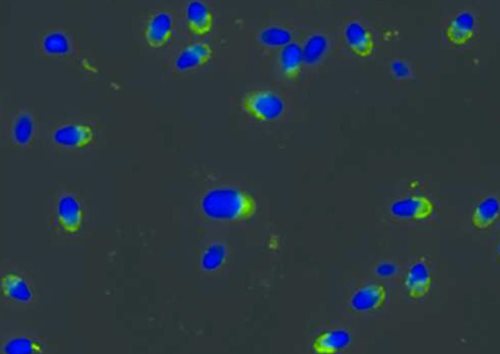Anti-PRKAR2A Monoclonal Antibody (Clone:Hs-36)

Figure 1: Immunocytochemistry staining of normal human sperma with anti-PRKAR2A antibody (intracellular signal in acrosomes, green); DNA visualized by DAPI (blue).
Roll over image to zoom in
Shipping Info:
For estimated delivery dates, please contact us at [email protected]
| Format : | Purified |
| Amount : | 0.1 mg |
| Isotype : | Mouse IgM |
| Purification : | Precipitation and chromatography |
| Storage condition : | Store at 2-8°C. Do not freeze. |
| Gene : | PRKAR2A |
| Gene ID : | 5576 |
| Uniprot ID : | P13861 |
| Alternative Name : | PRKAR2A, PKR2, PRKAR2 |
| Immunogen Information : | Freshly ejaculated human sperms were washed in PBS and extracted in 3% acetic acid, 10% glycerol, 30 mM benzaminidine. The acid extract was dialyzed against 0.2% acetic acid and subsequently used for immunization. |
PRKAR2A (protein kinase A regulatory type II alpha subunit), also known as PKR2, or PRKAR2, is a component of cAMP-dependent protein kinase complex. The inactive kinase holoenzyme is a tetramer composed of two regulatory and two catalytic subunits. cAMP causes the dissociation of the inactive holoenzyme into a dimer of regulatory subunits bound to four cAMP and two free monomeric catalytic subunits. Four different regulatory subunits and three catalytic subunits have been identified in humans. The PRKAR2A subunit has been shown to regulate protein transport from endosomes to the Golgi apparatus and further to the endoplasmic reticulum (ER). In sperm, this antigen can be used as an intra-acrosomal marker for evaluation of the physiological state of sperm cells as well as for selection of a suitable method of fertilization in the laboratories of assisted reproduction.
Immunocytochemistry Recommended dilution: 10 µg/ml
Staining technique: Membrane permeabilization (acetone) is essential.
Western Blotting
For Research Use Only. Not for use in diagnostic/therapeutics procedures.
| Subcellular location: | Cytoplasm, Cell membrane |
| Post transnational modification: | Phosphorylated by the activated catalytic chain. |
| Tissue Specificity: | Four types of regulatory chains are found: I-alpha, I-beta, II-alpha, and II-beta. Their expression varies among tissues and is in some cases constitutive and in others inducible. |
| BioGrid: | 111562. 73 interactions. |
|
There are currently no product reviews
|























.png)











